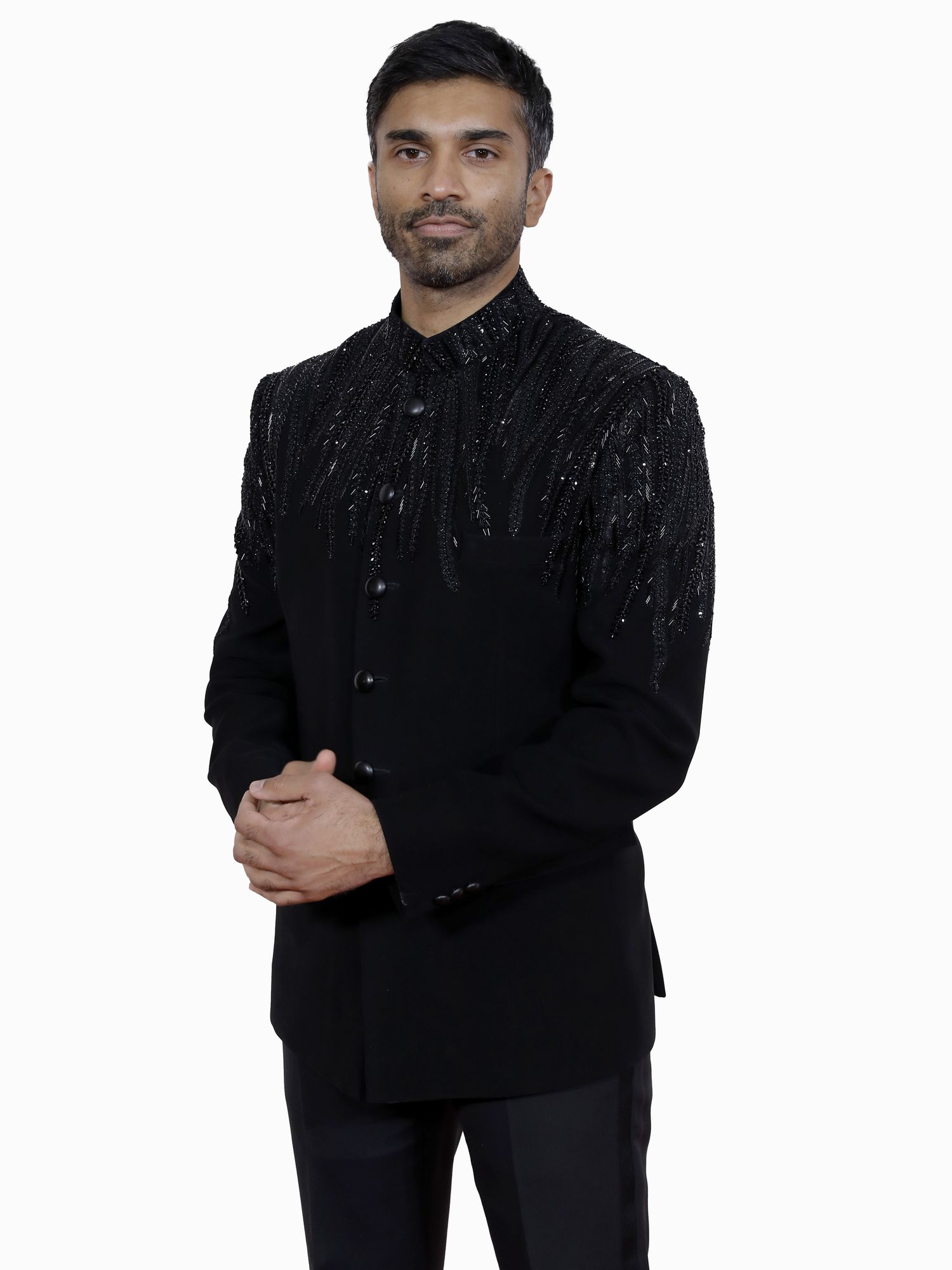If there is one word that defines Nikesh Patel’s acting career, it is unpredictability.
From romantic comedies to psychological thrillers, classical theatre to contemporary, boundary-breaking roles, Patel has quietly carved out a unique space for himself in British entertainment. Never one to be pigeonholed, the versatile British Asian actor has played everything from a top movie star in Starstruck to a detective with a fear of blood in The Devil’s Hour. Now, he is back where it all began – on stage – in a role that challenges both him and his audiences in all the best ways.
He is currently starring in the critically acclaimed play Speed at London’s Bush Theatre. Patel has returned to theatre after nearly a decade – and he has done so with a considerable bang. But Speed is no conventional stage comeback. Set during a speed awareness course, the play opens in familiar territory, with recognisable characters, snappy dialogue, and the promise of a workplace-style comedy. Then it veers into emotionally charged, unexpected terrain that audiences have found both disarming and deeply affecting.
“Speed is such a unique, strange beast of a play,” Patel says, with clear admiration. “It is 90 minutes, but a hell of a journey in that running time. The storytelling is quite heightened, despite having a recognisable, everyday setting. But it subverts those expectations and delivers something that – by the end – we know we have done our job when audiences come out of the theatre kind of gasping, not expecting the ending we deliver.”

Taking audiences somewhere entirely new is part of what has won Speed such admiration. That tonal shift – from comedy to catharsis – has made the production thrilling for audiences and demanding for its actors. For Patel, who plays a pivotal role in the show’s momentum and emotional payoff, it has been one of the most challenging experiences of his career.
“As a performer, you have to hold the comedy and hit those beats – but then there is an emotional payoff as well,” he explains. “I think it works because it is funny. People let their guard down. They expect it to be one thing, and it is really satisfying when you give them that. But then it is like – okay, now we are going to go here.”
The play’s clever structure and layered writing are not the only things that have struck a chord. For Patel, what makes Speed so meaningful is how unapologetically it speaks to specific cultural identities – particularly British Asian ones.
“We have had people say they are coming again and bringing friends – particularly the audiences we wanted to reach with this play, which is to get more brown audiences in. That has been really gratifying, because there are people who do not come to the theatre a lot. And that really means something, because there is humour and jokes in this show that rely on an audience that understands, for example, what certain words in Punjabi mean,” he said.

“There are Easter eggs for people who get the cultural references. That is not to say anyone else is unwelcome – far from it. But that has been really satisfying, and not something I have felt on stage for a long time.”
Beneath the laughs and cultural winks lies a serious core. Speed is ultimately a play about anger – where it comes from, how society judges it, and who is allowed to express it without consequence. For Patel, the script’s refusal to simplify these issues is one of its strengths.
“We did a lot of work in the rehearsal room to make sure our ending was not delivering a sort of neat message – like, ‘this is what you should think.’ Instead, it was saying, ‘look, anger is messy.’”
The play is brave enough to sit in that mess and ask: now what? One of Speed’s most poignant aspects is how it invites audiences to consider the consequences of suppressing rage – especially for people of colour, whose anger is often seen as threatening or unjustified. Patel’s character explores those tensions in unexpected ways.
“It asks us, why do we get angry? What do we do with our anger? And it uses, I guess, a comedic premise as a jumping-off point.”
The cast and creative team worked hard to honour the messiness of anger, avoiding easy answers or simplification. The response has been overwhelming. Audiences have laughed, cried, and in many cases, lingered long after the final curtain. Patel credits the live nature of theatre and the communal energy it creates.

“For me, theatre was always the place you went to explore something a bit out there, hard to define, a little bit boundary-pushing. I feel like this (Speed) definitely does that in spades. As much as film and TV have evolved, the journey these characters go through in 90 minutes live is hard to replicate. I would love to do more.”
Patel avoids reading reviews, choosing instead to focus on the performance itself. His return to the stage is all the more striking given how established he has become on screen. He rose to prominence with roles in Indian Summers and the TV reboot of Four Weddings and a Funeral, but it was his performance as the charming yet grounded Tom Kapoor in Rose Matafeo’s hit rom-com Starstruck that made him a fan favourite.
“That was a dream job from start to finish,” he says, smiling. “Initially it was meant to go into production in 2020 with a different actor playing Tom. Then the pandemic happened, and everything shut down. For whatever reason, when they got round to shooting again, the other actor was unavailable. I felt like a bit of a goal-hanger, because this fully formed, brilliant show had been written.”
But luck alone does not explain Starstruck’s success. Its modern, multicultural take on romance – without ever feeling preachy or tokenistic – resonated widely. At the heart of that were strong performances from both Matafeo and Patel. “I think Starstruck really captured something in a very modern, refreshing way. I loved it.”
On the opposite end of the spectrum, the psychological thriller The Devil’s Hour allowed Patel to explore darker, more complex territory. Co-starring Jessica Raine and Peter Capaldi, the British series was widely praised for its intricate plot and unnerving tone.
“It is epic, and the response has been great,” he says. “It feels ambitious in its storytelling. It is definitely a ‘put your phone down and pay attention’ kind of show. You cannot do the dishes while watching The Devil’s Hour.”
He is particularly thrilled that the series, always envisioned as a three-season arc, is being completed as planned.
“We have got a third season coming soon. In an age where really good stuff is getting scrapped or cancelled, I am really happy that The Devil’s Hour was always intended to be three seasons – and we finish it. We will close the loop and tell the full story. And it is a hell of an ending.”
Despite his growing fame, Patel remains grounded. He is drawn to good writing – particularly scripts that feel fresh and push boundaries. “If I am excited – and maybe slightly scared by it – then that is a good sign. There is a good level of fear when you are outside your comfort zone.”
He also believes great performances come from great scripts. “You can be the best performer in the world, but if you have got a bad script, you will get found out. But conversely, you can be elevated if the words are good. So, this is me celebrating the writer. If they give you good material, you can raise the level.”
Patel is thankful for the journey he has been on and values variety – not just in roles, but in genre, style, and medium. “I love being able to go back and forth between stage and screen.”
Looking ahead, Patel says that he has no dream role – only a desire to keep exploring different genres. “I would love to do some action. I would also love to play a villain. I do not want to give too much away – I get to dabble with that in the play.”
Now, he is also thinking about creating opportunities for himself. “I am more interested in shaping and making my own stuff. So maybe it is time to sit down and ask: what is the thing I have not had a chance to do yet? And how do I make it a reality? Because I am not getting any younger. Sometimes in this industry, you spend so much time waiting – maybe it is better to make it yourself.”
At a time when representation still lags across much of the entertainment industry, Patel is a quiet but powerful example of what can happen when British Asian actors are given the space to be many things – funny, flawed, angry, romantic, unpredictable.
As the final weeks of Speed approach, Patel remains grounded, grateful, and quietly ambitious. In a world of tidy formulas and predictable arcs, he is proving with projects like Speed that sometimes the most powerful stories are those that take the road less travelled.




